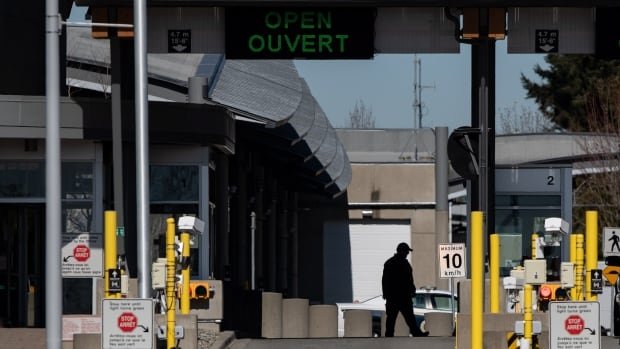Timarie Malentette is concerned the strike, which could begin as early as Friday afternoon, could cause lengthy delays at the Canada-U.S. border unless an agreement is reached.
The Windsor, Ontario, resident typically travels across the border five days a week to her job as an automotive engineer for Ford in Michigan.
“That’s not great,” she said.
“It’s already pretty congested at the border and it feels that way a lot of days. It’s going to be tough.”
Approximately 9,000 Canada Border Services Agency (CBSA) officers are set to go on legal strike action at 4pm ET on Friday.
The agency, which is under the federal government’s Treasury Board, has been in mediated negotiations since Monday with the Customs and Immigration Union (CIU), which is part of the Public Service Alliance of Canada (PSAC). The union voted 96 per cent in favour of striking in May after two years of failing to reach an agreement.
The CIU said it had no updates on the discussions at this time as mediation was ongoing.
“We are still hopeful that an agreement can be reached, but time is ticking if the government wants to avoid delays at the Canadian border,” said CIU spokesman Pierre Saint-Jacques.
Most CBSA employees are essential workers. Work by the Rules Some experts say that’s likely.
“Strikes can take many forms and we will see how this one plays out. The union leadership will decide how to proceed depending on how things develop,” Saint-Jacques said.

Officials “cannot intentionally delay border processing.”
A CBSA spokesperson said the border and ports of entry remain open and safe, and 90 per cent of frontline officers are considered essential workers.
“Under the federal Public Sector Industrial Relations Act, employees in essential services must provide uninterrupted border services,” Luke Reimer said in a statement.
“Processing at the border cannot be deliberately delayed,” Reimer said, citing the federal Public Sector Labor Relations Act.
“The CBSA is closely monitoring the situation. We are committed to working swiftly to address any impacts and will continue to keep the public informed through our website and social media channels.”

Phil Steuer is a freelance sound engineer working out of a recording studio outside of Detroit.
He says the strike will add another layer of hassle to his daily commute.
“It’s enough to get through Detroit’s busy times and events. It’s normal and I was prepared for it. New problems, new things to overcome.”
Steuer said being late to a studio session can be costly and result in an entire day’s work being lost.
“Tomorrow I’m going to help set up an event with a sound company. I’m going to leave a little early in case anything goes wrong. I can’t be late or I’ll lose my pay.”

Steuer said the potential delays were not a big enough issue to support the idea of the government intervening in employment action through back-to-work legislation.
“Is it a headache for me? Absolutely,” he said, “but I can understand why it would be.”
Even if that were to happen, Marentette said he couldn’t support a back-to-work bill for now.
“Not at the moment, but after a few weeks of slowdown I might be a little more in favor of a back-to-work bill,” she said.
Parliamentarians intervene in talks
Irek Kusmierczyk, MP for Windsor-Tecumseh, said he is confident a “fair” agreement will be reached.
“Border patrol officers are absolutely essential to this region,” he said.
“They matter. They’re our neighbors too. They work and live here.”
He says both sides need to stay at the negotiating table — mornings, noon, nights and weekends — to reach a final agreement.
“We know the importance of that border. We know that a third of trade passes through the region — $400 million every day.”
According to Kusmierczyk, the government’s goal is to “absolutely minimize” any disruptions at the border due to the importance of the free flow of goods, people and services.
Industry concerned about possible impact
The Canadian Association of Manufacturers and Exporters (CME) says the border enforcement situation could have a significant impact on manufacturers of all sizes across the country, for both imports and exports.
CME President and CEO Dennis Darby said the move would disrupt commercial traffic and business travel for the industry.
“Once again, manufacturers are being held hostage by circumstances beyond their control,” Darby said.
“Labor-related disruptions impacting the movement of goods are no longer the exception but the rule. The federal government must take a proactive approach to prevent these disruptions and protect manufacturing access to critical supply chain infrastructure.”
Transit Windsor issued a statement Thursday warning of possible delays to its bus tunnel service that runs under the Detroit River between the two cities and said it was monitoring the situation.
“Our tunnel buses are no different to any other personal or commercial vehicle crossing the border,” said Executive Director Tyson Klug. “They are not immune to delays, and we want passengers to know they may face delays when returning to Canada.”
The chamber of commerce in Ontario’s Windsor-Essex region says it has contacted all parties involved in the negotiations.
Rakesh Naidu, president and CEO, said any strike would hurt local businesses.
“Businesses that depend on a smooth and timely flow of goods and services across borders could face major challenges from the strike, including the automotive industry, which relies heavily on ‘just-in-time’ logistics,” he said.

